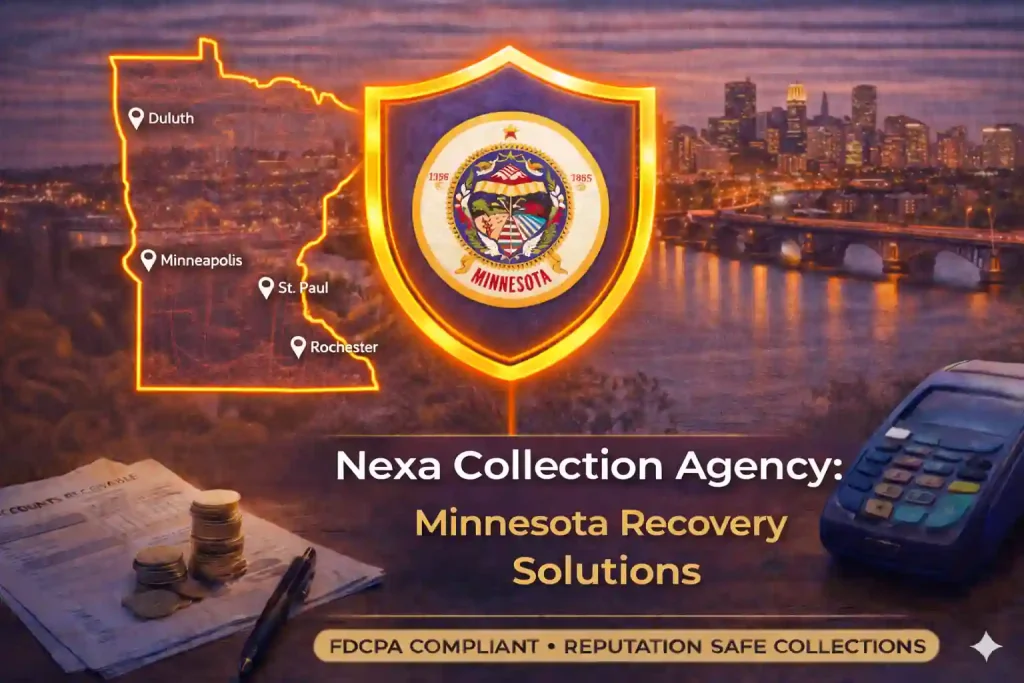In Minnesota—from the medical technology hubs of the Twin Cities and the industrial centers of Duluth to the agricultural powerhouses of Rochester and St. Cloud—doing business requires a balance of “Minnesota Nice” and legal precision. As of 2026, the Minnesota Debt Fairness Act has rendered traditional collection tactics obsolete. With a total ban on medical debt credit reporting and new income-based garnishment caps, standard agencies are struggling to stay afloat. You don’t just need a collector; you need a Minnesota-compliance expert who knows how to recover your revenue while shielding you from the Attorney General’s strict enforcement of the new debt fairness standards.
Nexa provides 100% reputation-safe, equipped with all 50-state collections license, offering free credit reporting, free litigation/bankruptcy scrubs, and zero onboarding fees. Secure – SOC 2 Type II & HIPAA compliant.
Need a Collection Agency? Contact us
The Minnesota Legal Landscape
Minnesota’s laws changed significantly in late 2024 and 2025. If your current agency hasn’t updated their “Garnishment Math” for the April 2025 shift, they are likely filing illegal orders that expose you to liability.
| Debt Category | Statute of Limitations | Minnesota Statute |
| Written & Oral Contracts | 6 Years | Minn. Stat. § 541.05 |
| Medical Debt Reporting | BANNED | Debt Fairness Act (2024) |
| Wage Garnishment | ALLOWED (Sliding Scale) | Minn. Stat. § 550.37 |
| Judgments | 10 Years (Renewable) | Minn. Stat. § 541.04 |
Critical Minnesota Rules for 2026:
-
The Medical Reporting Ban: Since October 2024, it has been illegal to report medical debt to credit bureaus in Minnesota. Nexa uses litigation-ready mediation and bank levies—not credit threats—to secure your payments.
-
The $4,000 Bank Shield: Under the new law, the last $4,000 in a debtor’s bank account is automatically protected from collections. Nexa’s data-scrubbing identifies “solvent” debtors so you don’t waste legal fees on protected assets.
-
Income-Based Garnishment (Active 2026): Garnishment is no longer a flat 25%. It now scales based on income, protecting lower-wage workers entirely. We calculate these sliding scales (ranging from 5% to 25%) to ensure 100% court compliance.
-
The 6-Year Clock: Minnesota is firm on its 6-year window. Nexa’s Step 1 & 2 system triggers immediate action before the statute of limitations resets or expires.
Cost-Effectiveness: The Nexa Advantage
-
Fixed-Fee Recovery ($15/account): Best for high-volume, early-stage debt. Debtors pay 100% directly to you. No commissions.
-
Contingency Service (20%–40%): Performance-based recovery. No Recovery, No Fee. We take the risk; you get the revenue.
Industries We Serve in Minnesota
-
Manufacturing & Industrial: B2B recovery for the Twin Cities and Duluth industrial corridors. We manage high-value freight brokerage, warehousing, and steel fabrication disputes.
-
Healthcare & Medical: 100% HIPAA-compliant. We specialize in the Minnesota Debt Fairness Act, using sophisticated mediation to recover patient balances that can no longer be reported to credit bureaus.
-
Colleges & Universities: From major research institutions to private liberal arts colleges, we handle tuition and housing recovery with a “student-first” diplomatic approach.
-
K-12 Private & Charter Schools: Diplomatic recovery for unpaid enrollment and textbook fees, tailored for Minnesota’s robust school choice landscape.
-
Accountants & CPA Firms: Recovery of professional service fees. We understand the Minnesota tax cycle and ensure you get paid without damaging the local client rapport you’ve built.
-
Banks & Credit Unions: Expert handling of delinquent consumer loans and deficiency balances using the state’s 10-year judgment renewal window.
-
Construction & Trades: Revenue recovery for HVAC, plumbing, and general contractors. We are experts in Minn. Stat. Chapter 514 (Mechanic’s Liens).
-
Restoration, Waste Management & Agribusiness: High-speed recovery for service providers and the agricultural sector that powers Greater Minnesota.
Recent Minnesota Recovery Results
Case 1: Rochester-Area Multi-Specialty Group (Medical)
-
The Problem: $160,000 in patient debt. The clinic feared the 2024 reporting ban had made their accounts “uncollectable.”
-
The Result: Nexa implemented a compliance-certified mediation strategy, recovering $112,000 in 90 days without needing a single credit report.
Case 2: St. Cloud Manufacturing Supplier (B2B)
-
The Problem: A $72,000 unpaid equipment contract from a vendor claiming “cash flow issues.”
-
The Result: Leveraging Minnesota’s 6-year written contract statute, we secured a full $72,000 recovery plus costs within 35 days of the initial demand.
Frequently Asked Questions (FAQ)
1. Can medical debt still be collected in Minnesota if it’s not on a credit report?
Absolutely. The 2024 Act only stops the reporting of the debt. You still have the legal right to sue for a judgment and garnish wages or bank accounts. Nexa’s legal network specializes in these judicial recoveries.
2. What is the $4,000 bank account protection?
As of 2024, Minnesota law protects the first $4,000 in a consumer’s bank account from being frozen or seized by debt collectors. Nexa uses advanced asset-location tools to identify accounts that exceed this limit before you spend money on legal fees.
3. Does Nexa handle the 2026 “sliding scale” garnishment?
Yes. Our systems are pre-set for the 2025/2026 garnishment rules, which cap deductions based on the debtor’s income level (starting as low as 5%). This ensures your collection orders are not rejected by Minnesota employers.
Would you like me to draft a 2026-compliant “Notice of Rights” letter specifically for your Minnesota accounts? Contact us
Popular cities:

